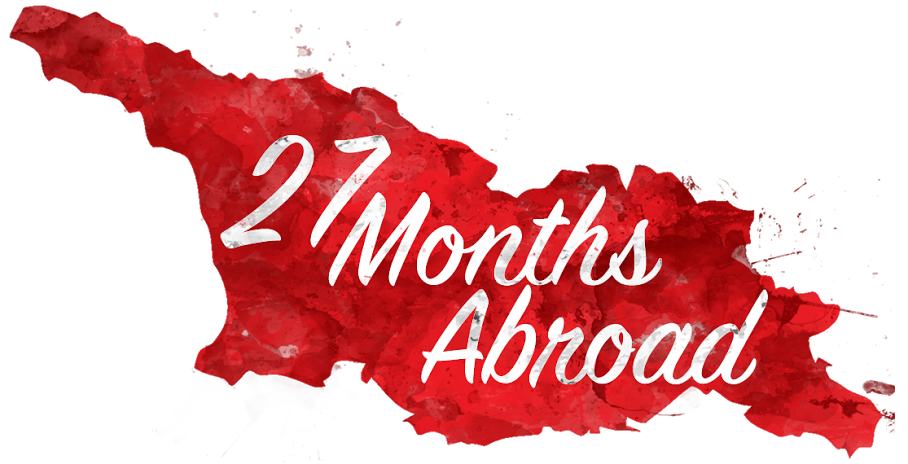Bringing awareness to gender inequality in this country has arguably become my strongest passion. I am promoting gender equality in half of my projects because I have committed my service to it. Thus, when my friend Kate asked me if I would like to collaborate with her on a gender specific project, I said yes. On a cold November afternoon, we both visited the American Corner, in Kutaisi, in hopes to create some sort of a gender-related club. We were both bouncing around ideas like doing a film club featuring strong female role models. Another idea was creating a book club. Essentially, we wanted to break down some of the gender stereotypes and promote gender equality through lively discussions and interactions.

After much thought, our idea expanded into creating one-day workshops in various villages and towns throughout Georgia. Along with our two other friends, Liv and Rose, Saqartvelo Smashes Stereotypes (SSS) was born. Saqartvelo means Georgia in Georgian and I couldn’t be more proud of my friends for coming up with an awesome name. The strategy was simple: each workshop would have 3 sessions. The sessions are identified through a needs assessment. The community chooses the top 3 topics they would like us to cover. The sessions range from Employability, Social Media Best Practices, Gender Norms/Stereotypes, Community Activism, Domestic Violence/Early marriage, and more. Typically, the local English teachers in the community act as our translators.

We have had 5 separate workshops throughout Georgia. Workshops have ranged anywhere from 7 participants to over a 100. During the sensitive gender topics, we have gender-split discussions. Our male Peace Corps Volunteers will lead the discussion for the boys, and we lead the discussions for the girls. The session sparks great conversations and discussions. Sometimes, I will catch the students having side-conversations during the sessions. At first, I want to tell them to pay attention to the topic at hand. However, I’ll eavesdrop and I will notice that they are actually discussing the topic! Since this is not a formal educational session and attendance is optional, we will let the side-conversations continue if they are not distracting.
Other times, the exact thing happens. A student will make a comment and participate in the session, but the comment can derail the discussion. For instance, I was leading a session on gender discrimination in the workplace. I asked the teenagers to provide examples of gender discrimination. They started mumbling amongst themselves for ideas. A brave young girl raised her hand and proclaimed, “There is gender discrimination in the U.S, but there is no gender discrimination in Georgia.” This girl was trying to convince me that Georgia, which is listed as number 79 in the world on the Gender Inequality Index, has no gender inequality! I took a deep breath and said, “Just because we don’t recognize something, it doesn’t mean it is not there.”

These comments fuel my motivation for Saqartvelo Smashes Stereotypes. Girls in Georgia are encouraged to do all the housework while the boys are not. It might not seem like a big deal, but it was a huge cultural shock aspect when I first came to Georgia. During training (PST), Justin and I would take our empty, dirty plates to the kitchen after eating. My host mom and sister welcomed the help- but only from me! In fact, they insisted that Justin leaves the plates on the table. Then, they yelled at me at said, “Bechi Ara! Marto Gogo!” Which translates to, “Boys, no! Only girl!” To combat the gender stereotypes in a polite way, I said, “In America, both can do it. Why only girls? Justin wants to help.” My host sister literally had no answer other than, “this is the way it has always been done.” This is a train of thought that needs to be questioned.
According to the World Bank Group’s Georgia Country Gender Assessment in 2016, “Household responsibilities appear to play a critical role in reducing female labor force participation, but not male labor force participation.” It is important to learn how to identify what is gender discrimination and the simplest forms it can take place. So when I told that teenage girl that example, she remained speechless. I could tell that she too started thinking about the “logic” behind the tradition. If no one ever questioned tradition, women today will not be able to vote or own property- even in the United States.
We also try to instill a sense of self-confidence and self-power. During the domestic violence session, Rose does a beautiful job in explaining that help is available in Georgia. She discusses the resources and the hotlines available in the country. It would be useless if we discuss American self-help tactics, so we provide local resources as much as possible. Domestic violence is a big problem all around the world; however, talking about it is more stigmatized here. According to EurasiaNet, “In 2015, police registered 901 domestic-violence cases – an 88 percent increase over reported instances in 2014, based on police figures cited by the ombudsperson’s office. In 2014, the latest year for which data is available, the government’s emergency-assistance hotline recorded 9,290 calls related to domestic violence.”

Therefore, to aid in positive change, we create a safe space for these discussions. One of my favorite parts of this project is the community involvement. The teachers at these schools are highly involved and are excited to co-lead these discussions. The students that participate come voluntarily; therefore, they are motivated to learn about these topics. Witnessing the community involvement and the student’s eagerness is a sign of a bright future for Georgia in combating these gender stereotypes.
